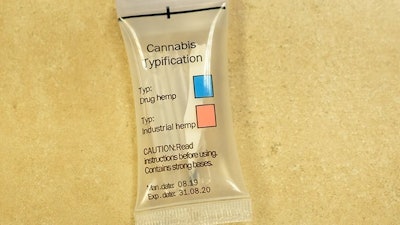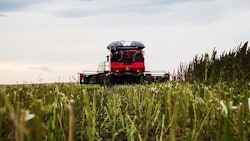
As local law enforcement agencies
continue struggling to decipher the difference between hemp and
tetrahydrocannabinol (THC)-rich cannabis, the state of Virginia is hoping to
quell the issue with a new field test kit.
The Virginia Department of Forensic
Science recently purchased 16,150 Cannabis Typification testing kits—otherwise
known as the 4-AP test—to distribute to police departments across the
state.
While the test cannot determine the
exact levels of cannabinol (CBD) and THC in cannabis, it does measure the ratio
of the two cannabinoids to ascertain whether the plant is hemp or THC-rich
cannabis.
The test turns different colors
based on the ratio of the cannabinoids in the plant sample. If the
concentration of THC is more than CBD, the liquid in the kit turns blue,
indicating it is illegal and needs to be sent to the laboratory for further
testing. If the plant has more CBD than THC, the liquid in the kit turns pink,
indicating it doesn’t need lab testing.
The test needs to be used in
conjunction with the Duquenois-Levine field test, which is widely used by
police to identify cannabis. If that test comes back positive, officers can use
the 4-AP test to narrow down whether the plant is most likely THC-rich cannabis
or hemp.
Linda Jackson, the director of the
Virginia Department of Forensic Science, says the Duquenois-Levine test is
still an important part of the equation.
“We did test [the 4-AP test] on
some non-cannabis types of plants, and it does give a light blue result with
oregano, which could be confused with the result for marijuana. That’s why in
our instructions, we’re telling law enforcement to use Duquenois-Levine test
first,” Jackson says.
The test is not approved as a field
test by the Virginia Register of Regulations, meaning it can’t be used for
testimony; it can, however, be useful for investigation.
The kits were purchased for $97,500
with a grant from the Virginia Department of Criminal Justice Services, and any
law enforcement agency across the state can sign up to receive them.
“Virginia passed [its] hemp
legislation in March of 2019, and so as soon as that legislation was signed, it
became more difficult to determine whether cannabis was illegal or not,”
Jackson says. “We just wanted to provide it as a tool for law enforcement for
that purpose.”
It’s an issue law enforcement has
been grappling with since hemp became legal, and especially since its interstate
transport was made legal in October 2019 with the U.S. Department of
Agriculture’s interim final hemp rule. Stories across
the country have emerged in recent months about truckers facing felony charges
for transporting hemp, including a high-profile case in
New York where law enforcement touted a marijuana bust on social media—though
the seized product allegedly is hemp. That case is still moving through courts.
The USDA and U.S. Department of
Justice are reportedly working to develop a database that can track and share
information on hemp production with law enforcement, according to IEG
Policy. The first iteration of that system, however, may be far-off and
rudimentary.
In the meantime, the kits used in Virginia provide a solution for officers looking to quickly discern between THC-rich cannabis and hemp.
























